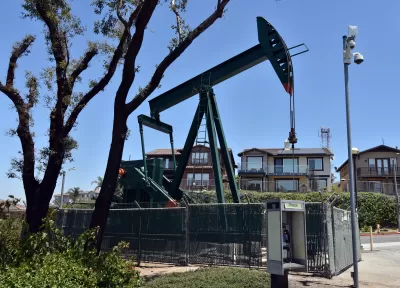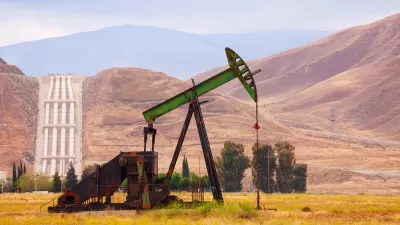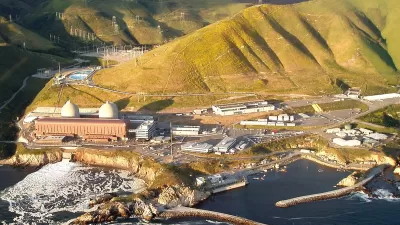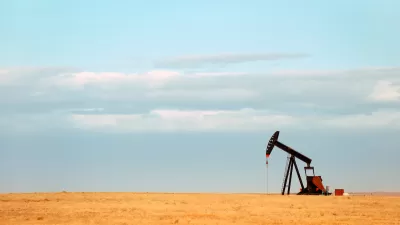Environmentalists gear up for battle to reject a referendum funded by Big Oil on a law passed last year that would ban oil and gas drilling within 3,200 feet of homes, schools, nursing homes, and hospitals.

After years of unsuccessful efforts to mandate health and safety buffer zones around oil and gas wells in California, Democratic state legislators managed to pass Senate Bill (SB) 1137 last year.
“The legislation prohibits the California Geologic Energy Management Division from approving a new oil well within 3,200 feet of a ‘sensitive receptor,’ defined as a residence, education resource, community resource, healthcare facility, dormitory or any building open to the public, reported Taryn Luna for the Los Angeles Times on Aug. 31, 2022.
Opponents argued that the bill would raise already sky-high gas prices and criticized the rushed nature in which the legislation was approved during floor debates in the Legislature.
Joe Garofoli, San Francisco Chronicle’s senior political writer who covers national and state politics, reported on July 26 that a “committee backed by environmentalists and community groups — launched with $500,000 in seed funding by ex-Google CEO Eric Schmidt — will announce Wednesday it is fighting the referendum that would overturn SB 1137.
The new committee, called the Campaign for a Safe and Healthy California, is hoping to counter a ballot measure on the November 2024 slate that is funded with at least $20 million from oil companies called Stop the Energy Shutdown. The oil company funded committee, backed with $4.5 million from Sentinel Peak Resources California LLC, and other petroleum companies, wants to overturn SB1137. The law has been on hold since the secretary of state certified the industry-backed ballot measure.
Governor weighs in
Gov. Gavin Newsom made clear his dissatisfaction, to put it mildly, with the oil industry when the referendum was certified in February for placement on the Nov. 5, 2024 ballot, the second referendum to qualify to date that would repeal laws passed by the legislature.
“It’s one thing for Big Oil to make record profits as they rip off Californians at the pump, he said on Feb 3 in a statement.
[See related post: Holding Oil Companies Accountable for California's High Fuel Prices, April 4, 2023]
“It’s quite another to push to continue harmful drilling near daycares and schools and our homes.”
The two sides
Oil companies sponsoring the referendum maintain that oil not produced in California must come from countries without the stiff regulations imposed on the state's drillers.
“California oil extractors produce the only climate-compliant oil in the world and follow the world’s strictest environmental and labor laws,” Rock Zierman, chief executive officer of the California Independent Petroleum Association, said in a statement. “Every barrel we don’t produce here must be tankered into our crowded ports, mostly from countries that oppress LGBTQ+ communities, restrict women’s rights, and decimate the world’s rainforests and environment.”
In fact, California oil production has decreased for nearly four decades, replaced, as Zierman noted, by foreign sources, according to the California Energy Commission. Alaskan oil imports have decreased for nearly the same time period.
Outspent but not out-motivated
Chris Lehman, who is managing the Campaign for a Safe and Healthy California, “said he is confident that his side will be able to raise enough to get its message out,” added Garofoli.
Californians do not want toxic oil drilling next to their schools, next to neighborhoods, hospitals, period,” Lehman said. “As long as we can make the case that that’s what this does, we’re going to be fine.”
FULL STORY: New political group launches to take on Big Oil over a ban on drilling near schools, hospitals

Study: Maui’s Plan to Convert Vacation Rentals to Long-Term Housing Could Cause Nearly $1 Billion Economic Loss
The plan would reduce visitor accommodation by 25,% resulting in 1,900 jobs lost.

North Texas Transit Leaders Tout Benefits of TOD for Growing Region
At a summit focused on transit-oriented development, policymakers discussed how North Texas’ expanded light rail system can serve as a tool for economic growth.

Using Old Oil and Gas Wells for Green Energy Storage
Penn State researchers have found that repurposing abandoned oil and gas wells for geothermal-assisted compressed-air energy storage can boost efficiency, reduce environmental risks, and support clean energy and job transitions.

Private Donations Propel Early Restoration of Palisades Playground
Los Angeles has secured over $1.3 million in private funding to restore the Pacific Palisades playground months ahead of schedule, creating a modern, accessible space that supports community healing after recent wildfires.

From Blight to Benefit: Early Results From California’s Equitable Cleanup Program
The Equitable Community Revitalization Grant (ECRG) program is reshaping brownfield redevelopment by prioritizing projects in low-income and environmental justice communities, emphasizing equity, transparency, and community benefits.

Planting Relief: Tackling Las Vegas Heat One Tree at a Time
Nevada Plants, a Las Vegas-based nonprofit, is combating the city’s extreme urban heat by giving away trees to residents in underserved neighborhoods, promoting shade, sustainability, and community health.
Urban Design for Planners 1: Software Tools
This six-course series explores essential urban design concepts using open source software and equips planners with the tools they need to participate fully in the urban design process.
Planning for Universal Design
Learn the tools for implementing Universal Design in planning regulations.
Ascent Environmental
Borough of Carlisle
Institute for Housing and Urban Development Studies (IHS)
City of Grandview
Harvard GSD Executive Education
Toledo-Lucas County Plan Commissions
Salt Lake City
NYU Wagner Graduate School of Public Service





























